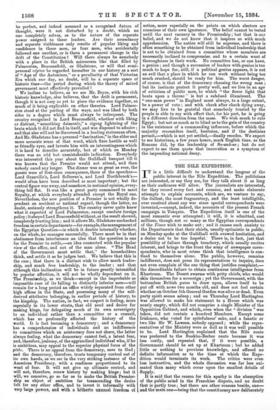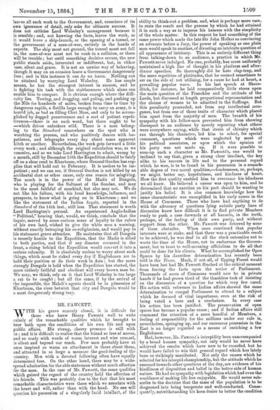THE NILE EXPEDITION.
IT is a little difficult to understand the langour of the public interest in the Nile Expedition. The politicians are interested, or say they are, for they talk about it as long as their audiences will allow. The journalists are interested, for they record every fact and rumour, and make elaborate attempts to explain accounts, which are, we venture to say, the dullest, the most fragmentary, and the least intelligible, ever received about any war since special correspondents were invented,—except, indeed, the accounts of the present French campaign in Tonquin. The Expedition itself is one of the most romantic ever attempted ; it will, it is admitted, cost millions, though not so many as the Egyptian correspondents of the Times wish to make out ; and it causes such anxiety to the Departments that their chiefs, usually optimistic in public, on Monday spoke at the Guildhall with avowed hesitation, and a desire not to be too hopeful. There is, in fact, just that possibility of failure through treachery, which usually excites interest, and brings to the front the army of ifewspaper corre- spondents, who in most crises think that intelligence is con- fined to themselves alone. The public, however, remains indifferent, does not press its representatives to inquire, does not even complain of the one thing that justifies complaint,— the discreditable failure to obtain continuous intelligence from Khartoum. The Desert swarms with petty chiefs, who would skin themselves for a sovereign ; yet the Government, with the bottomless British purse to draw upon, allows itself to be put off with news two months old, and does not feel certain whether on October 5th General Gordon was alive or dead. Even party spirit seems asleep ; and on Thursday Lord Hartington was allowed to make his statement to a House which was nearly empty, which did not comprise a single Minister of the Opposition Cabinet, and which, even when the "division " was taken, did not contain a hundred Members. Except some Irishmen, who voted for spitefulness' sake, and a fanatic or two like Sir W. Lawson, nobody opposed ; while the repre- sentatives of the Ministry were as dull as it was well possible to be. Lord Hartington explained that the Nile route was preferred to the Suakim-Berber route because it was less costly, and repeated that, if it were possible, a Government should be set up at Khartoum ; but he added little or nothing to previous knowledge, and offered no definite information as to the time at which the Expe- dition would terminate its work. The critics were even leas instructive, and the whole discussion was far less ani- mated than many which occur upon the smallest details of Supply.
It is said that the reason for this apathy is the absorption of the public mind in the Franchise dispute, and no doubt that is partly true ; but there are other reasons beside, one— and the main one—being that the constituency now deliberately leaves all such work to the Government, and, conscious of its own ignorance of detail, only asks for ultimate success. It does not criticise Lord Wolseley's management because it is sensible ; and, not knowing the facts, leaves the work, as it would leave a ship-launch, or the opening of a tunnel, or the government of a man-of-war, entirely in the hands of experts. The ship must not ground, the tunnel must not fall in, the man-of-war must not be sunk in a collision, or there will be trouble ; but until something decisive occurs, the new public stands aside, interested or indifferent, but, in either case, silent and grave. It is not an unwise way of behaving, though it may on an occasion leave a Government dangerously free ; and in this instance it can do no harm. Nothing can be attained by worrying Lord Wolseley. He has ample means, he has the strongest interest in success, and he is fighting his task with the stubbornness which alone can enable him to conquer. It is obvious enough where the diffi- culty lies. Towing, and dragging, and poling, and pushing up the Nile for hundreds of miles, broken from time to time by dangerous rapids, a flotilla large enough to carry an army, is a horrid job, as bad as filling Chat Moss, and only to be accom- plished by dogged perseverance and a sort of patient repeti- tiveness—there is no such word, but there ought to be —which drives onlookers wild. There is a man belong- ing to the Standard somewhere on the spot who is watching the process, and who positively dances with im- patience, and telegraphs every day about some apparent hitch or another. Nevertheless, the work gets forward a little every week ; and although the original calculation was, as we conceive, and as we take Lord Hartington to admit, wrong by a month, still by December 15th the Expedition should be fairly off on a clear road to Khartoum, where General Gordon has sup- plies that will hold out to February. It is useless to be im- patient; and we can see, if General Gordon is not killed by an accidental shot or other cause, only one reason for misgiving. Too much is in the power of the Mudir of Dongola, who is playing for the Sultanet of the Soudan, and may be the most faithful of mankind, but also may not. We do not like his failure, with his local knowledge, influence, and prospects, to know what is going on in Khartoum ; and we like the statement of the Indian faquir, reported in the Standard of the 14th inst., still less. That statement is worth Lord Hartington's perusal. An experienced Anglo-Indian "Political," hearing that, would, we think, conclude that the faquir, moved by some curious sense of loyalty to the rulers of his own land, wished to give the white men a warning, without exactly betraying his co-religionists, and would pay to his statement grave attention. He maintains that all Dongola is secretly hostile to the Expedition, that the Mudir is allied to both parties, and that if any disaster occurred in the front, a rising behind the Expedition would convert it into a serious calamity. It is absolutely useless to worry about such things, which must be risked every day if Englishmen are to hold their position or do their work in Asia ; but the more strongly Dongola is held when the Expedition has started, the more entirely faithful and obedient will every brown man be. We may, we think, rely on it that Lord Wolseley is too large a rat to be caught ; but all the same, if by the arrival of the impossible, the Mahdi's agents should be in p6ssession of Khartoum, the river betwixt that city and Dongola would be a most dangerously strong trap.



































 Previous page
Previous page